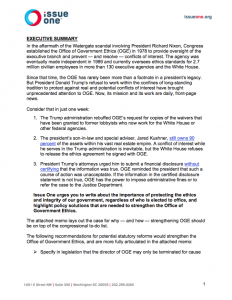Analysis
Here’s why modernizing the Office of Government Ethics (OGE) should be on top of the congressional to-do list
In the aftermath of the Watergate scandal involving President Richard Nixon, Congress established the Office of Government Ethics (OGE) in 1978 to provide oversight of the executive branch and prevent — and resolve — conflicts of interest. The agency was eventually made independent in 1989 and currently oversees ethics standards for 2.7 million civilian employees in more than 130 executive agencies and the White House.
Since that time, the OGE has rarely been more than a footnote in a president’s legacy. But President Donald Trump’s refusal to work within the confines of long-standing tradition to protect against real and potential conflicts of interest have brought unprecedented attention to OGE. Now, its mission and its work are daily, front-page news.
Consider that in just one week:
- The Trump administration rebuffed OGE’s request for copies of the waivers that have been granted to former lobbyists who now work for the White House or other federal agencies.
- The president’s son-in-law and special adviser, Jared Kushner, still owns 90 percent of the assets within his vast real estate empire. A conflict of interest while he serves in the Trump administration is inevitable, but the White House refuses to release the ethics agreement he signed with OGE.
- President Trump’s attorneys urged him to submit a financial disclosure without certifying that the information was true. OGE reminded the president that such a course of action was unacceptable. If the information in the certified disclosure statement is not true, OGE has the power to impose administrative fines or to refer the case to the Justice Department.
The attached memo lays out the case for why — and how — strengthening OGE should be on top of the congressional to-do list.
The following recommendations for potential statutory reforms would strengthen the Office of Government Ethics, and are more fully articulated in the attached memo:
- Specify in legislation that the director of OGE may only be terminated for cause
- Authorize OGE to serve as a central clearinghouse for all ethics actions taken by designated agency ethics offices
- Authorize OGE to publish recusal agreements of high-ranking Senior Executive Service employees
- Authorize OGE to impose specific standards for ethics training and mandate ethics training for all high-level executive branch officials within a certain amount of time after joining an administration
- Authorize OGE to investigate allegations of ethics violations for high-ranking employees (presidential appointments with and without Senate confirmation, SES and Schedule C)
- Clarify that the director of OGE has the authority to conduct investigations, subpoena witnesses, compel production of documents, issue civil penalties for violations for high-ranking officials
The nation can ill afford such a weak watchdog of our ethical standards — those that are at the bedrock of the public’s faith in our government. Congressional action to address the long-established statutory weaknesses and failures of the OGE is long overdue.
Issue: Executive Branch Ethics

You Might Be Interested In
No related articles available.


